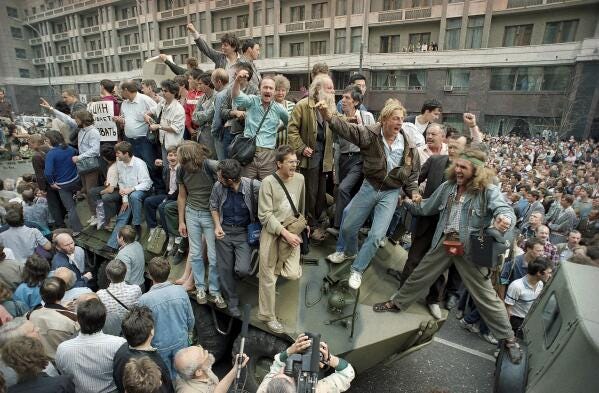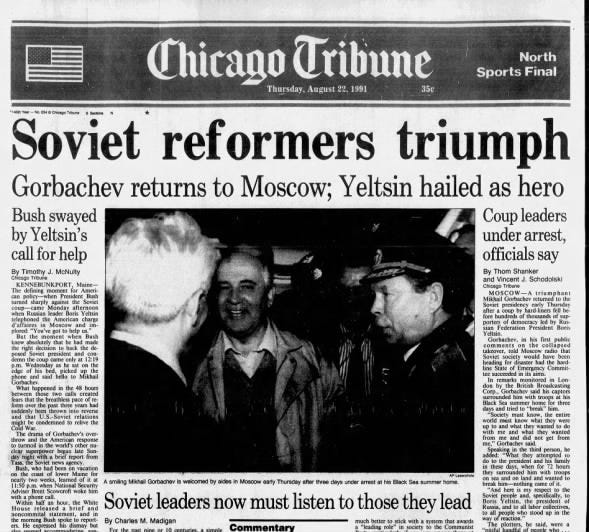THE GREATEST HEIST: Chapter 8 - The $50 Billion Russian Laundromat
Exclusive: Jeffrey Epstein and Donald Trump made their fortunes laundering Billions stolen from the Soviet Union by the KGB and the Russian mob.
October 1991: The Noose Tightens
In the weeks before his death, Robert Maxwell had become increasingly paranoid. Something hadn't felt right for a while - people were out to get him, and he didn't know whose side anyone was on anymore.
The first warning had come six months earlier when Senator John Tower died in a plane crash. Twenty-two others perished with him on Atlantic Southeast Airlines Flight 2311. Tower wasn't just Maxwell's employee at Macmillan Publishing; he had saved the KGB and British double agent from public exposure several times, most recently when he covered up the press baron’s role in the Iran-Contra Affair.
Tower was a Republican Senator from Texas, which made his friendship with a suspected KGB asset challenging but politically expedient. When CIA Director George HW Bush needed a backchannel to the KGB hierarchy, he asked Tower for an intro to Maxwell, and the senator from Texas facilitated it.
As the Iran-Contra Commission chairman, Tower knew exactly where the money went. Ari Ben-Menashe told me that Tower personally facilitated the transfer of Iran-Contra funds to Maxwell, receiving $200,000 in Swiss accounts for arranging access. Tower was Bush's guarantee that the $600 million CIA slush fund was secure with Maxwell—a trust that proved catastrophic.
Now Tower was dead, and Maxwell had lost his bridge to then-President Bush just as everything was unraveling.
The shock had come when Ben-Menashe arrived with devastating news. Years earlier, Israeli Prime Minister Yitzhak Shamir had given Maxwell permission to borrow against the $600 million Iran-Contra slush fund for his purchasing spree—including the Daily Mirror, the New York Daily News, and Macmillan Publishing. Maxwell thought this was settled business. But now Ben-Menashe told him the Americans wanted their $600 million back, and the Israelis wanted the money Maxwell had pocketed from every arms deal.
"Maxwell reneged on the deal," Ben-Menashe would later testify. The media baron had been using the slush funds as his personal bank account.
Maxwell’s other lifeline from the Soviet Union was soon to face trouble of his own. Gorbachev was in power, ushering in an era of glasnost, but for months there had been rumors of a hardline revolt brewing in the Soviet ranks.
August 19-21, 1991: The Coup
On the morning of August 19, Muscovites switched on their televisions only to discover Swan Lake on repeat— the traditional signal during political crises. Tanks soon rolled through Moscow streets. The State Committee on the State of Emergency announced they’d taken power. Gorbachev was “ill”, they said. He was actually under house arrest in his Crimean dacha.
The coup leader: Vladimir Kryuchkov, head of the KGB and Maxwell's handler.
As Russians flocked to the streets, it became clear the military was not behind the coup. Some soldiers refused to take action against their fellow citizens.
On August 20, Boris Yeltsin climbs onto Tank Number 110 outside the Russian White House. CNN broadcasts it worldwide— the image that would define the resistance. Yeltsin denounces the coup to gathering crowds: "The reactionaries will not triumph!"
By August 21, the coup collapses. Paratroopers refuse to storm the White House. The coup leaders flee. Kryuchkov is arrested at Vnukovo Airport trying to escape. It’s possible the hardliners didn’t believe the coup would succeed because for months they had been taking extreme steps to transfer Soviet assets offshore.
Later, KGB defector Sergei Tretyakov brought with him 5,000 classified documents that confirmed Kryuchkov had already moved $50 billion worth of Communist Party funds to unknown Western locations. French intelligence documented that the Party controlled 84 companies outside the Soviet Union and maintained over 7,000 bank accounts.
On August 24, Gorbachev returns to Moscow, but the world has changed. At the Russian parliament, Yeltsin forces him to read aloud the minutes of his own cabinet's betrayal. The Soviet Union has three months left to live.
August 22 - October 1991: Window Season in Moscow
The deaths begin immediately after the coup fails:
August 22: Interior Minister Boris Pugo found dead with his wife. Official cause: murder-suicide.
August 24: Marshal Sergey Akhromeyev found hanging in his Kremlin office.
August 26: Nikolai Kruchina, the Communist Party's chief treasurer controlling billions in "Party's Gold," falls from his seventh-floor Moscow apartment window. Documents related to Party finances are found in his apartment, then disappear.
The pattern continues through autumn:
October 6: Georgy Pavlov, who managed Party finances for 18 years, falls from a window.
October 17: Dmitry Lisovolik, deputy chief of the Party's international department, falls from a window after investigators discover $600,000 in cash in his department.
Russian media dubs it "Window Disease." Former KGB Colonel Oleg Kalugin confirms in his memoir "Spymaster": "At least seven leading members of the CPSU, responsible for the finances of the party, and several of Maxwell's KGB collaborators, were found dead.”
Paid subscribers can access a deeper dive, including Maxwell’s state of mind in the weeks prior to his death, an inventory of the money he had hidden in offshore holdings, and a detailed schematic of the KGB’s scheme to extract $50 billion from the USSR before its demise.






